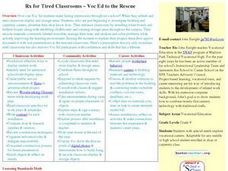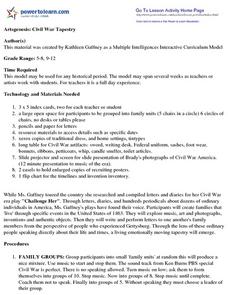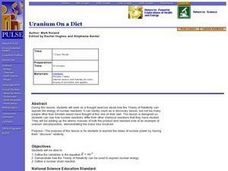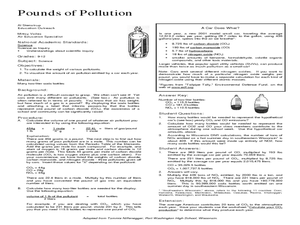Curated OER
If My Configurations are Correct
Students write the electron configuration of elements in the ground state. In this chemistry lesson, students draw how subatomic particles are arranged in the atom. They construct Lewis dot diagrams of valence electrons.
Curated OER
Bouncing Balls
Students create a polymer ball in the lab. In this chemistry lesson, students identify the different properties of the polymer they created. They explain what type of chemical reaction took place.
Curated OER
Rx for Tired Classrooms: Vocational Ed to the Rescue
Secondary carpenters apply their skills to improve display spaces in classrooms at their campus. Includes a contract between workers and teachers who sign on for improvements in the their rooms. Concurrent exploration of building and...
Curated OER
Synthesis of Information
Locating and synthesizing information is an essential part of the research process but can be overwhelming for many young writers. Eliminate some of the stress and confusion, this resource suggests, by separating these steps. To focus...
Curated OER
Let's Keep Track of Grades
Students participate in a technology project. This lesson is a hands-on spreadsheet project where students are responsible for keeping track of their grades for class. The students learn to enter data into a spreadsheet, create...
Curated OER
Artsgenesis: Civil War Tapestry
Students explore the Civil War and the many emotions that emerged during this era. The teacher arranges students in groups of families and prepares them to simulate typical responses during this era. The Civil War and Gettysburg is...
Curated OER
An Ad for an Element
Learners prepare an ad for an element, including properties and uses, in an attention getting format such as that used in the advertising business.
Curated OER
Physical and Chemical Changes
Eighth graders view a PowerPoint presentation that assist them in distinguishing between physical and chemical changes. They compare their observations of demonstrations to a list of clues recognizing types of changes.
Curated OER
Waste Not, Want Not
Young scholars consider the types of debris that litters beaches and conduct research on waste management. They then interview professionals in a particular field of waste management and write reports for a booklet about garbage and...
Curated OER
The Sunflower
Twelfth graders analyze the ethical and moral decisions made by people during the Holocaust. They role play a situation placing them in an ethical delima. They must make a choice and defend it to their peers. Readings and test...
Curated OER
Research project
Eighth graders explore reference materials and then complete a research project. In this research project lesson, 8th graders choose the best reference source to use. Students learn to correctly site sources for their project. Students...
Curated OER
Explore Your Natural Habitat
Students identify habitats and understand why they are important to our environment. In this environmental lesson students design their own habitat, observe and record data on the impact their habitat has on the environment.
Curated OER
One for the Money
Eighth graders sort items as they are shown one at a time by the teacher. They attempt to identify the one physical trait the teacher is looking for (metal and not metal). After several objects have been shown and placed in groups, the...
Curated OER
Structure of the Atom
Young scholars practice drawing the atomic structure of several different elements. They complete critical thinking questions about atomic structure and compare the atomic mass units for different ions and isotopes of an element.
Curated OER
Bouncing Balls
Students create a polymer to demonstrate its properties and develop an awareness of the wide variety of uses for polymers.
Curated OER
Gopher, Part 2: Gopherin'
Students explore how to access a gopher site using a root menu. Several options are presented with their definitions and the fastest routes examined in this lesson. The lesson is designed for librarians with little or no net experience.
Curated OER
How Can We Accurately Make Different Solutions of Different Concentrations?
High schoolers work together to create different solutions made from different concentrations of liquids. They record and analyze their data. They answer discussion questions to complete the instructional activity.
Curated OER
Chemical Reactions
Students work in groups to define chemistry vocabulary including the terms reactants, products, exothermic and endothermic. They then combine the group definitions to arrive at a consensus definition for the class. Students also listen...
Curated OER
Enslaved and Running
Young scholars use runaway slave advertisements to discover how the language varies from the 18th to 21st century. Using primary source documents, they research the brutality of slavery and the desire of those in slavery to be free. ...
Curated OER
Uranium On a Diet
Students examine how nuclear reactions differ from other chemical reactions they have studied. They add up atomic masses of both the product and reactant side of an example of uranium decomposition, demonstrating mass loss involved.
Curated OER
Atoms, Kinetic Theory, Solids and Fluids
Students identify and describe the building blocks that make up an atom. They also compare the ages of atoms to the ages of the materials they compose,as well as, give examples that illustrate the small size of atoms.
Curated OER
Meet Mikhail Ippolitov-Ivanov!
Learners listen to music and review instruments of the orchestra. They explore musical terms, solo, texture and theme of the music and discuss other features of the music. Students research and discuss the life of Mikhail Ippolitov-Ivanov.
Curated OER
Forces And Energy
Students investigate the atom and how it is formed. They conduct research using a variety of resources and then construct a model of the atom. Then students have class discussion. The instructional activity includes background...
Curated OER
Pounds of Pollution
Students examine pollutants and investigate air pollution emitted by a car in a year. In this air pollution lesson students complete an activity and make calculations.

























